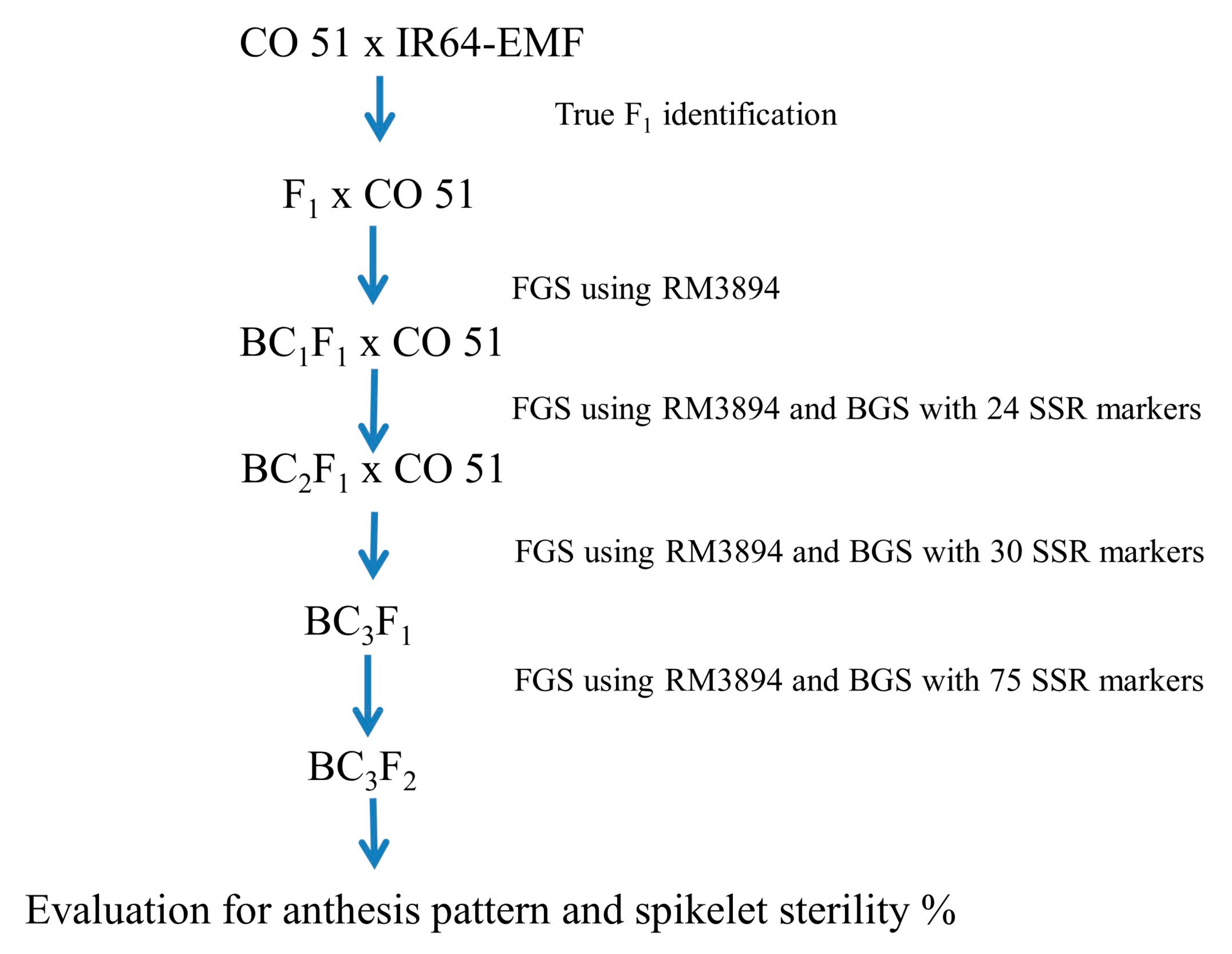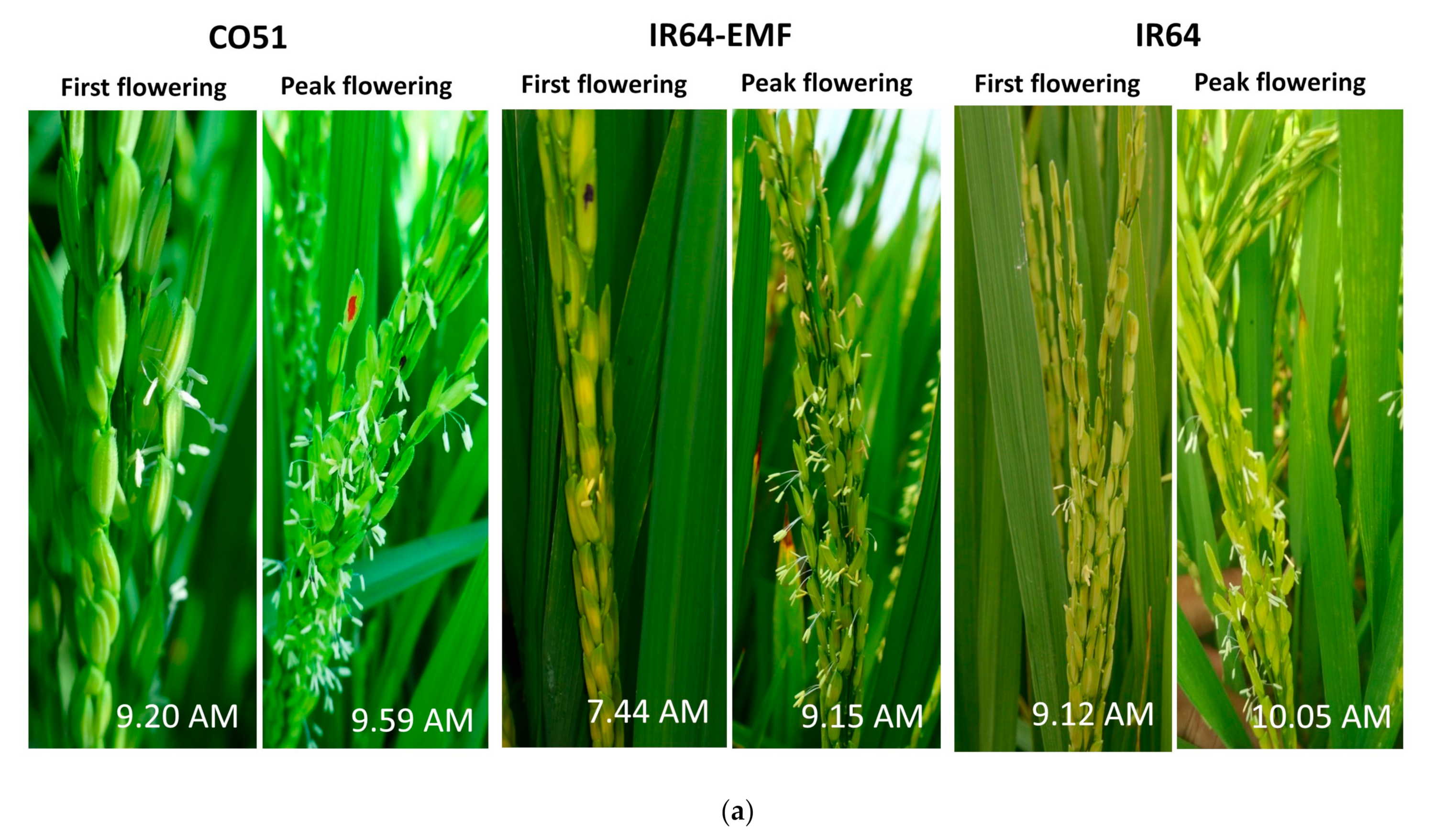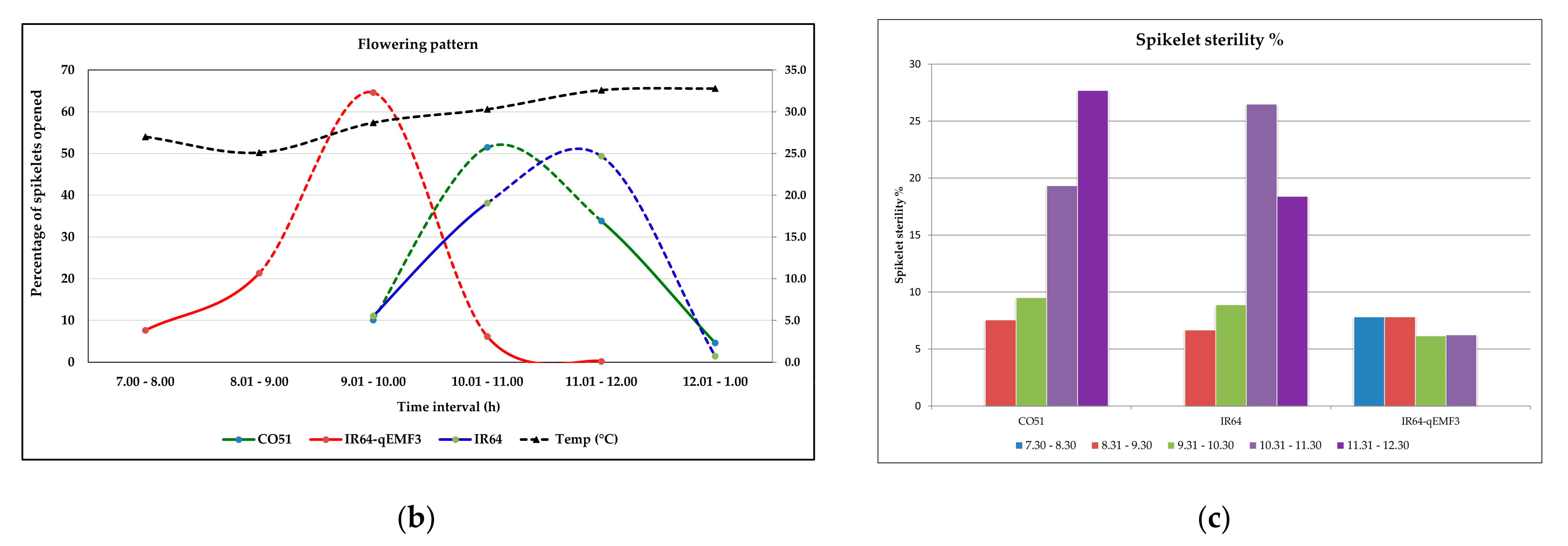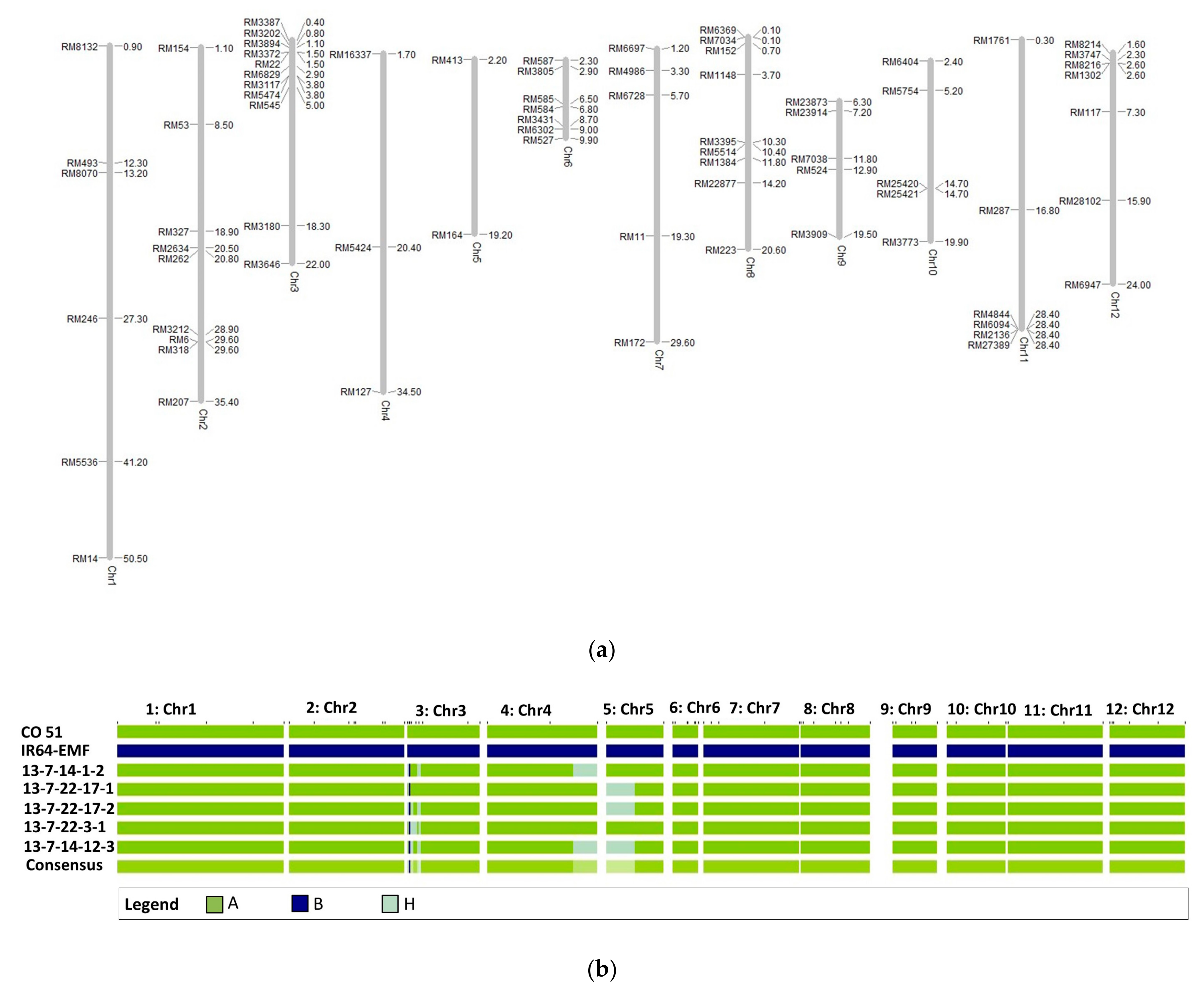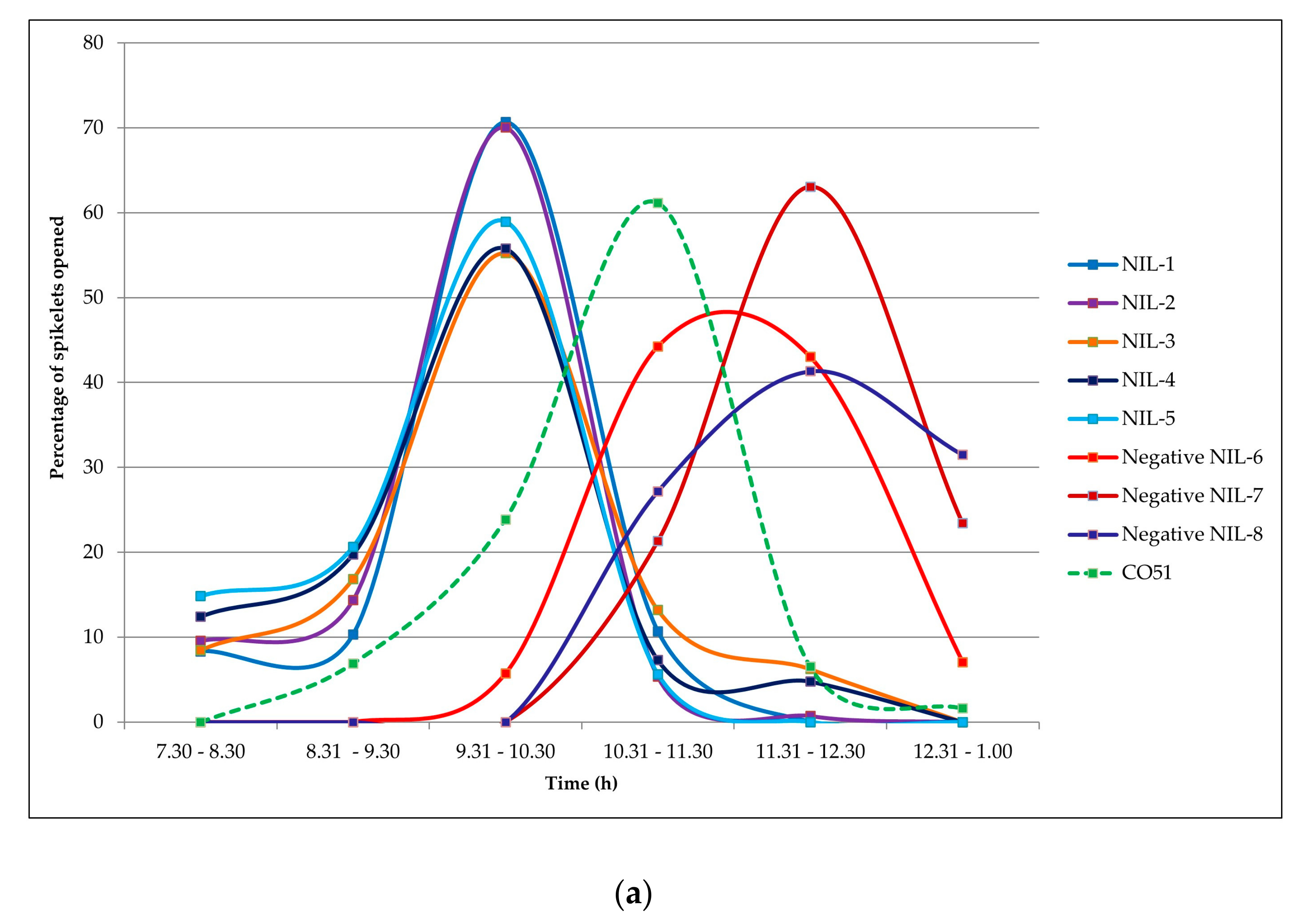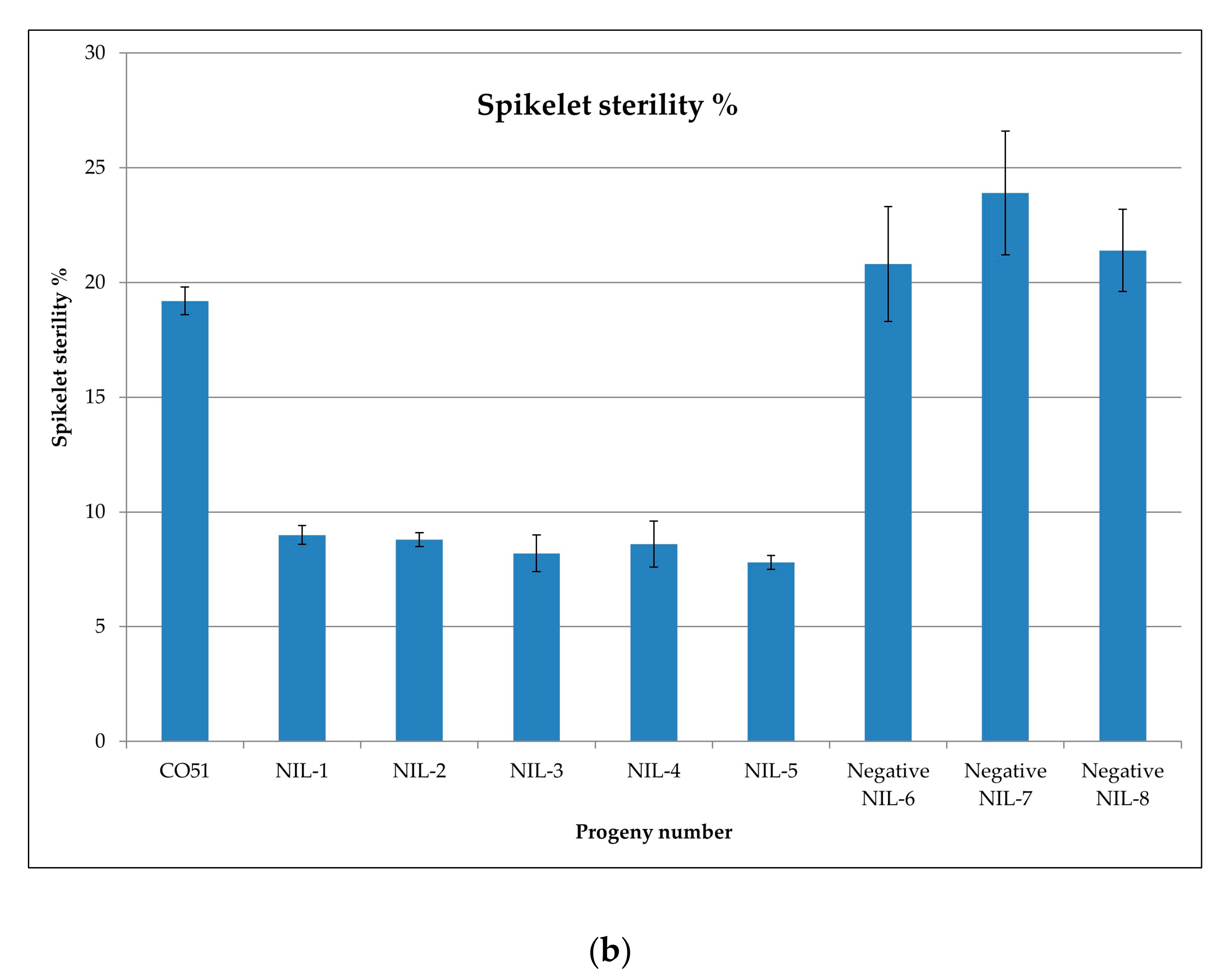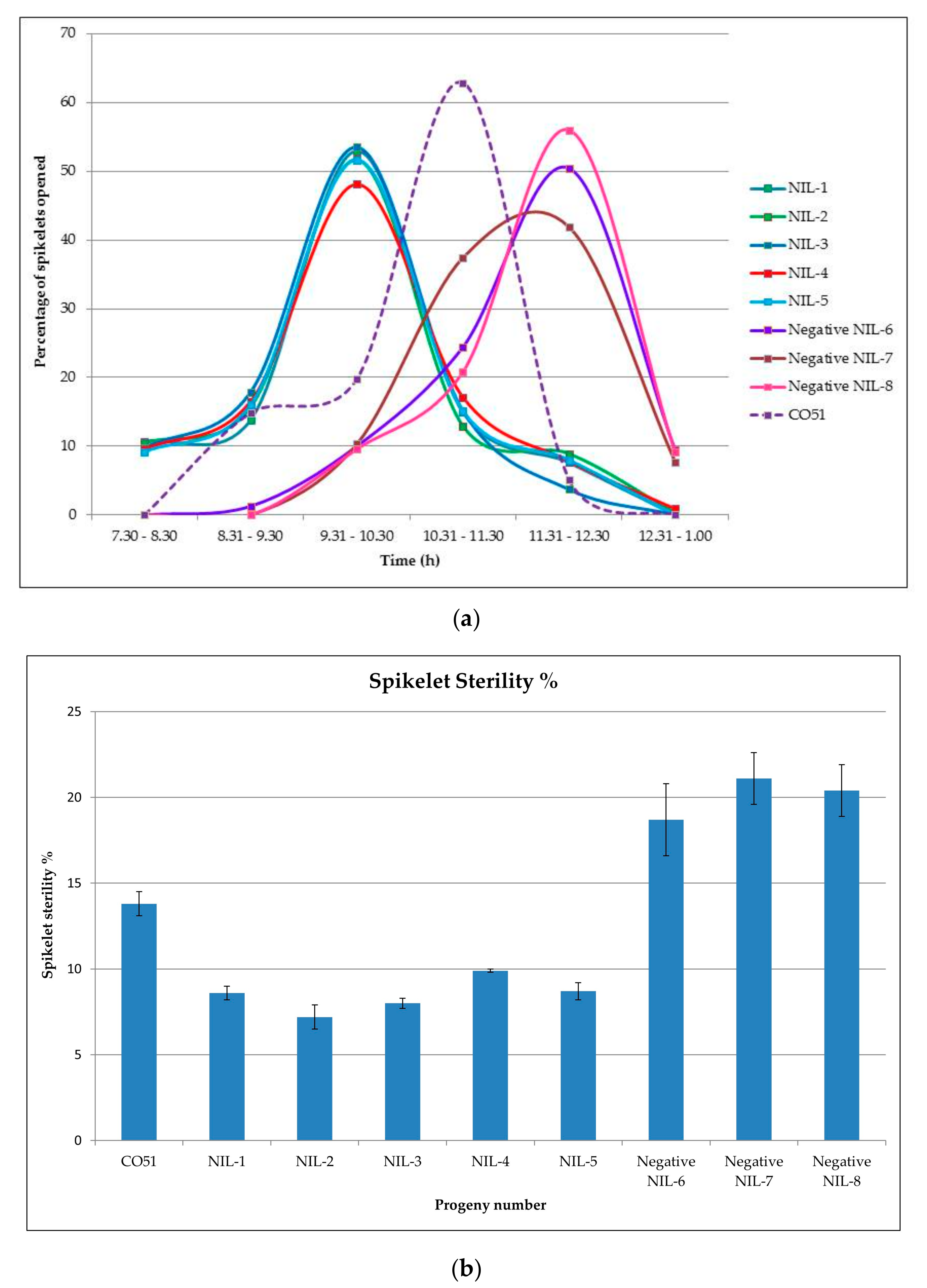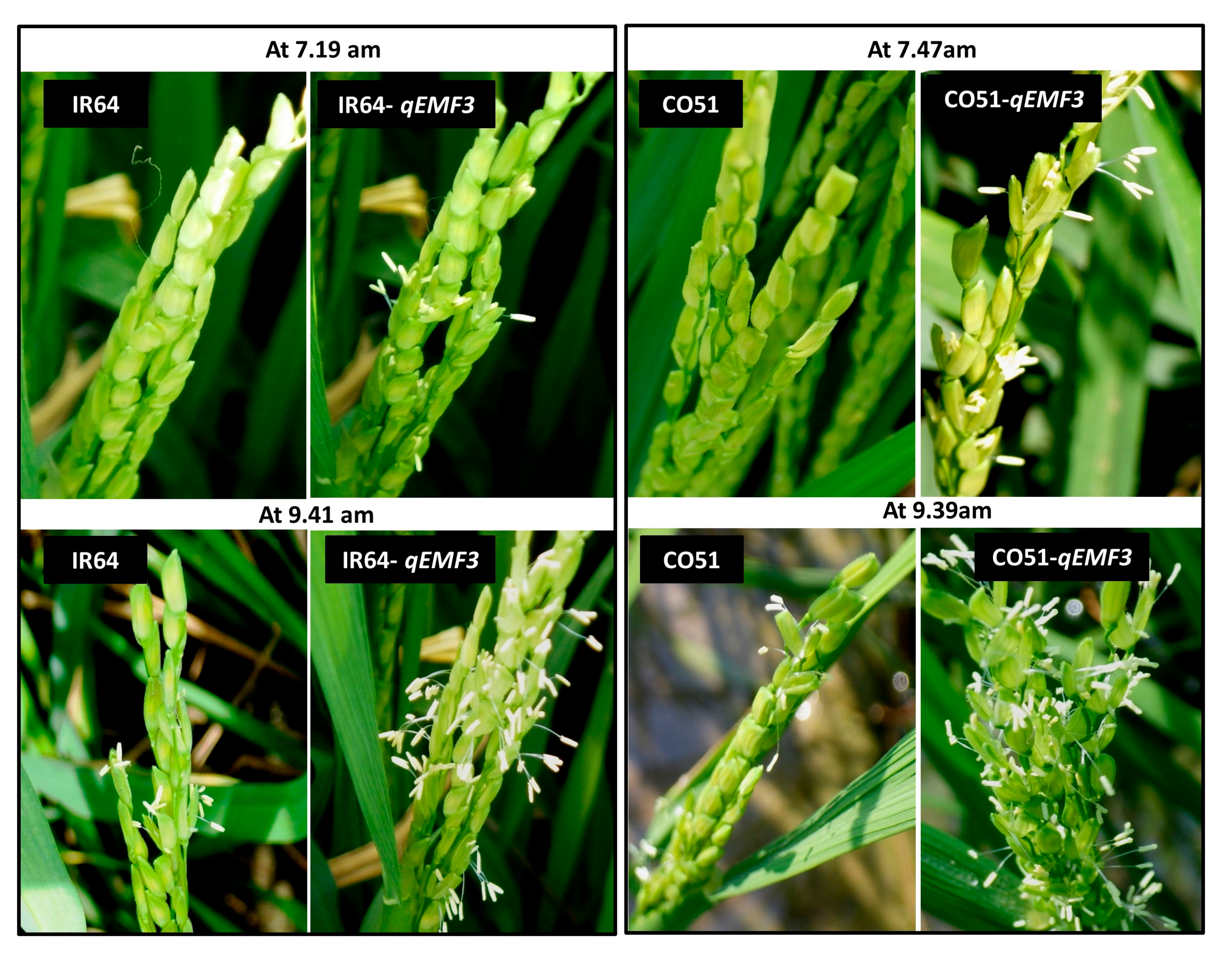Abstract
By 2050, the rice production needs to be increased by at least 50% in order to meet the growing food demands of the global population. Among various yield limiting factors, high temperature is fast becoming a major threat to sustain rice yields due to its increased frequency of occurrence and severity of stress events. The development of heat-resilient rice cultivars has been slow due to the lack of relevant donors for heat tolerance traits and limited information regarding the genetic basis of these component traits. The early morning flowering (EMF) trait, contributing to heat escape by promoting flowering/anthesis during cooler hours in the morning is demonstrated to offer protection against high-temperature-induced failure of pollination and fertilization. In this study, evaluation of CO 51, IR64 and IR64-qEMF3 (NIL of IR64 harboring QTL promoting EMF revealed that qEMF3 promoted early morning flowering in IR64-qEMF3 (1½ to 2 h earlier than IR64) and thereby reduced the sterility by about 8.15%. Attempts through marker-assisted backcross breeding led to development of advanced backcross progenies (NILs) of CO 51, harboring qEMF3. Evaluation of 88 BC3F2 progenies identified 19 progenies harboring qEMF3 under homozygous conditions. Evaluation of NILs of CO 51 harboring qEMF3 during summer 2019 revealed that the NILs exhibited early (7.30 a.m.) onset of anthesis by 1½ h and completed its peak anthesis well around cooler hours (9.30 a.m.) of the day and thereby recorded reduced spikelet sterility (7.8–9.0%) than their recurrent parent CO 51 (19.2%). The current study clearly demonstrated the efficacy of early morning flowering in the mitigation of yield losses under high-temperature conditions in a farmer preferred rice variety.
1. Introduction
In recent years, there has been an upsurge in the global population that in turn increases the food consumption and exerts additional pressure on the agricultural systems and related resources [1]. By the year 2035, the rice production has to reach 852 million tonnes from about 700 million tonnes for which rice production should increase by 0.6–0.9% per annum [2]. High temperatures have become a severe limitation to global agriculture practices and food security, particularly for major food crops, such as rice [3,4]. Every 1 °C increase in the global mean temperature is expected to reduce the rice yields across the globe by 3.2% [5]. A high-temperature episode (>35 °C) coinciding with flowering/anthesis/grain filling affects the pollination and fertilization leading to greater yield losses due to increased spikelet sterility and reduced head rice recovery [6,7,8,9,10,11,12,13,14,15,16]. This occurs as a result of reduced pollen germination on the stigma, pollen tube growth and the failure of anther dehiscence [6,17,18,19]. Heat stress induced reduction in rice yields have been recorded in India, Pakistan, China and Thailand [20,21,22]. Therefore, it has become necessary to develop rice varieties with enhanced heat stress resilience either through heat tolerance or heat escape, wherein the latter leads to flowering before the onset of high temperature. Such traits can help the rice plants to avoid heat stress and sustain yield under predicted warmer environments [6]. To feed the world’s growing population in the face of global warming, the crop breeders are challenged to develop crops that can endure future climate change.
Under tropical conditions, the flower opening phenomenon of the modern cultivars occurs between 3.5 and 5.5 h after sunrise [23,24]. Under high-temperature greenhouse circumstances, the spikelets that flower in the later hours of the day are highly prone to heat stress and lead to significant increase in sterility. Rice exhibits diverse mechanisms including tolerance [19] and avoidance through transpiration cooling [25,26] to overcome heat induced yield losses. Intensive research in this area has identified the time of flowering [25] or the early morning flowering (EMF) trait, has the potential to mitigate heat induced spikelet sterility [23,27]. Physiological examinations revealed that the EMF trait found in the wild rice O. officinalis favored shedding of a greater number of viable pollens on the stigma and thereby reduced heat induced spikelet sterility. Research efforts at NARO, Japan by utilizing O. officinalis, identified a major effect of QTL qEMF3 on chromosome three, promoting flowering by 1½ to 2 h in two rice cultivars, Nanjing and IR64 [23].
Our earlier experiments have revealed the existence of wide genetic variations for heat induced spikelet sterility in rice [28]. Evaluation of mega rice varieties of South India revealed the extreme susceptibility of a popular rice variety CO 51 to high-temperature conditions due to its late morning flowering pattern [20,29]. CO 51 is a short-duration (105–110 days) high-yielding rice variety notified for cultivation across 14 different states of India and is suitable for cultivation in all the seasons (Kharif/Rabi/Summer) in Tamil Nadu. Thus, shifting the flower opening time of CO 51 to cooler early morning hours (Early Morning Flowering—EMF) is expected to be useful in avoiding the high-temperature-induced spikelet sterility [6]. Based on these reports, the present study was formulated to develop early morning flowering version of CO 51 through marker-assisted backcross breeding. Outcomes of this study demonstrated the potential of the EMF trait in mitigating heat induced spikelet sterility to sustain rice production under a changing climate.
2. Materials and Methods
2.1. Evaluation of CO 51, IR64-qEMF3 and IR64 Rice Varieties for Flowering Pattern
Three rice genotypes, namely CO 51, IR64 and IR64-qEMF3 were raised under field conditions in plots of 5.76 m2 area during summer 2017. Twenty-one-day-old seedlings were transplanted at a spacing of 20 × 20 cm and the blanket recommendation of 150:50:50 kg NPK/ha was applied. At the time of transplanting, 16.6 kg/ha K was applied as a basal dose; first top dressing (50 kg/ha N) at 15 days after planting, second top dressing at the panicle initiation stage (50 kg/ha N and 16.7 kg/ha K) and third top dressing at heading stage (50 kg/ha N and 16.7 kg/ha K). At the time of flowering, observations on time of initiation of anthesis/flowering was recorded in 10 tagged panicles and the number of spikelets opening at every 30 min interval was also counted from 7.30 a.m. to 12.30 p.m. Spikelets opening at different time intervals were marked using different colored fine-tipped pens (blue, green and red). The flowering/anthesis pattern was observed under clear weather conditions. For the given genotype, all the observations were repeated over a period of 4–5 days. The total number of spikelets that opened over a specific hour interval was calculated and used to determine the percentage of opened spikelets.
2.2. Marker Assited Backcross Breeding (MABB) Strategy for the Development of Early Morning Flowering Lines
A short-duration and high-yielding rice cultivar CO 51 exhibiting greater susceptibility to elevated temperature conditions was used as a recurrent parent. It shows moderate resistance to blast disease and insects, such as brown plant hopper and green leaf hopper [30]. The donor parent is an NIL of a popular variety IR 64 (IR64-qEMF3) harboring the Early Morning Flowering QTL (qEMF3), mapped from O. officinalis. Marker-assisted backcross breeding strategy was followed to develop the NILs of CO 51, harboring qEMF3 (Figure 1). Both CO 51 and IR64-qEMF3 rice genotypes were crossed and true F1 plants were identified using the foreground marker (RM3894). To develop the BC1F1 plants, the F1 plants were then backcrossed with the recurrent parent CO 51. The presence of the target locus qEMF3 was confirmed using the marker RM3894. This approach was followed until the BC3F1 generation, in which the progenies were subjected to foreground selection to confirm the presence of target loci and background selection to calculate the recurrent parent genome recovery percent. Graphical GenoTypes (GGT) Version 2.0 software was used to depict the RPG recovery [31].
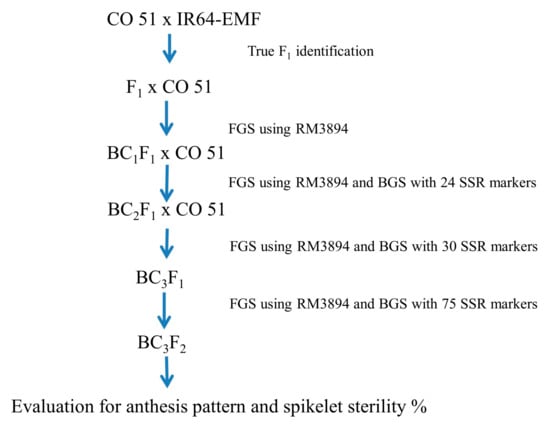
Figure 1.
Marker-assisted backcross breeding strategy for the development of early morning flowering version of rice cultivar CO 51.
2.3. Evaluation of CO 51-NILs Harboring qEMF3 for Anthesis Pattern
NILs of CO 51, harboring the contrasting alleles of qEMF3 linked SSR marker RM 3894, were evaluated for their anthesis pattern and spikelet fertility under high-temperature conditions during summer 2019 (January 2019 to May 2019). A total of five families of CO 51 harboring the homozygous donor allele of qEMF3 linked marker RM 3894 and three families harboring the recurrent parent allele RM 3894 (# 6, # 7 and # 8) were evaluated for their anthesis patterns. All the agronomic practices were followed as per the protocol mentioned in the previous section. Both anthesis pattern and the spikelet fertility/sterility rates were measured as described earlier. The same progenies were evaluated for their agronomic performance, anthesis pattern and spikelet fertility during Kharif 2019 (June 2019 to November 2019).
3. Results
3.1. Development of CO 51-NILs Harboring qEMF3
Our earlier experiments have revealed that high-temperature-induced spikelet sterility in CO 51 is attributed to its delayed onset of anthesis. Evaluation of CO 51, IR64 and IR64-qEMF3 under field conditions (33.8 to 34.4 °C) revealed the increased susceptibility of CO 51 and IR 64 exhibiting later morning flowering pattern than IR64-qEMF3 (Table 1). In both CO 51 and IR64, the anthesis started at around 9.00 a.m., whereas in IR64-qEMF3 the anthesis started much earlier i.e., at 7.30 a.m. itself (Figure 2a,b). The anthesis/flowering pattern of IR64-qEMF3 reached its peak much earlier (9.30 a.m.) when compared to CO 51 and IR64 (10.30 to 11.30 a.m.). The spikelet sterility was found to be the lowest in IR64-qEMF3 (6.9%), whereas it was much higher in CO 51 (15.5%) and IR64 (15.05%) varieties (Figure 2; Table 1). Similarly, grain yield/plant was higher in IR64-qEMF3 (51 g) than its recurrent parent IR64 (46.2 g) Among the spikelets opened during different time intervals, those spikelets that opened during the late hours of the morning and noon exhibited increased spikelet sterility than the spikelets that opened during the early morning hours (Figure 2c).

Table 1.
Maximum and minimum temperature values recorded during the flowering period, spikelet sterility and the grain yields of CO 51, IR64 and IR64-qEMF3 varieties.
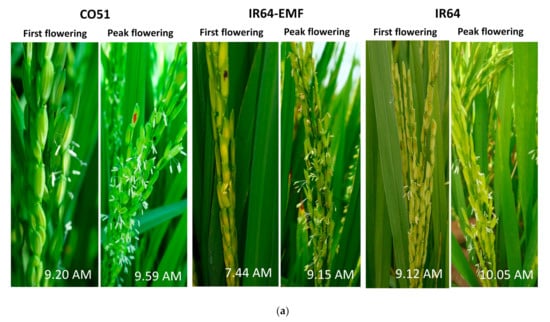
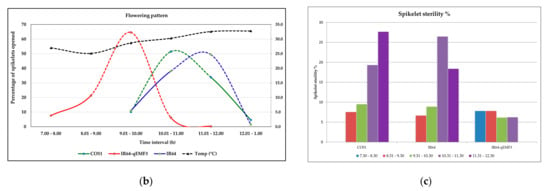
Figure 2.
Flowering pattern of the rice genotypes: (a) first and peak flowering of CO 51, IR64 and IR64-qEMF3; (b) diurnal variations in the anthesis patterns of CO 51, IR64 and IR64-qEMF3 and the corresponding air temperature; and (c) spikelet sterility %.
Genotyping using qEMF3 linked marker RM3894 identified the true hybrids between CO 51 and IR64-qEMF3. Evaluation of BC1F1 progenies of CO 51 harboring qEMF3 identified three progenies with recurrent parent genome recovery of 73–86.5 percent (Table 2). Utilization of superior BC1F1 progeny possessing the highest RPG recovery of 86.5% resulted in the generation of 34 BC2F1 plants with 90.6–94.7% of CO 51 genome recovery. Background selection of 6 positive BC3F1 progenies using 75 genome-wise SSR markers revealed that RPG recovery was in the range of 93.1 to 97.9%. An elite BC3F1 progeny with the highest RPG recovery (97.9%) was selected and forwarded to the BC3F2 generation population (Figure 3 and Figure 4). Evaluation of 88 BC3F2 progenies using RM3894 identified 21 progenies harboring the target loci under homozygous conditions. Out of this, five selected BC3F2 progenies possessing high yield potential and grain quality traits similar to CO 51 were advanced for further evaluation.

Table 2.
Number of backcross progenies evaluated and their recurrent parent genome recovery.

Figure 3.
Foreground selection of the BC3F2 progenies using RM3894 linked with the early morning flowering QTL (qEMF3).
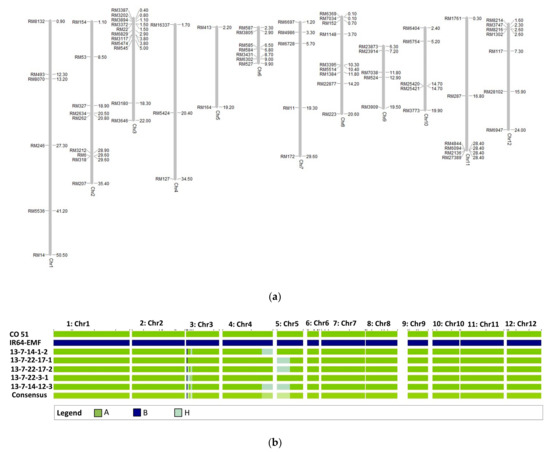
Figure 4.
Graphical representation of 75 genome-wide SSR markers used for genotyping (a) and their allelic status in the 5 superior BC3F1 plants (b). Green shade area represents recurrent parent genome; dark blue represents donor genome; light blue shade represents the heterozygous nature of the genome.
3.2. Evaluation of CO 51-qEMF3 NILs for Anthesis Pattern and Spikelet Sterility % under High Temperature Conditions
The NILs of CO 51, harboring the contrasting alleles of RM3894 linked to qEMF3, were evaluated for their anthesis patterns and their spikelet fertility rates under high-temperature conditions during summer 2019 (January 2019 to May 2019). A total of five families harboring the donor allele of RM3894 (qEMF3) under homozygous condition were evaluated for their anthesis pattern along with three families harboring the CO 51 allele of RM3894 (#6, #7, #8) and their parents. The flowering coincided with high-temperature conditions.
The recurrent parent CO 51 had a delayed onset of anthesis after 9.00 a.m. and its peak anthesis was recorded after 10.30 a.m. EMF versions of IR 64 and CO 51 showed early onset of anthesis (before 7.30 a.m.) and peak anthesis around cooler hours (9.30 a.m.) of the day (Figure 5a and Figure 6). All the three negative lines, viz., six, seven and eight exhibited flowering patterns similar to that of the recurrent parent, CO 51 (Figure 5a). The spikelet sterility % of the recurrent parent CO 51 (19.2%) was higher than the progenies of CO 51 harboring donor allele of RM3894 (7.8–9%). The introduction of the qEMF3 allele into CO 51 reduced the spikelet sterility up to 9–10% (Table 3; Figure 5b). The delay observed in the anthesis of the recurrent parent CO 51 (19.2%) and three negative progenies (20.8–23.9%) is accountable for the increased spikelet sterility %. Grain yield/plant of the recurrent parent was recorded as 40.1g, whereas it was ranging between 51.3 g and 57.0 g for the NILs harboring the qEMF3 QTL.
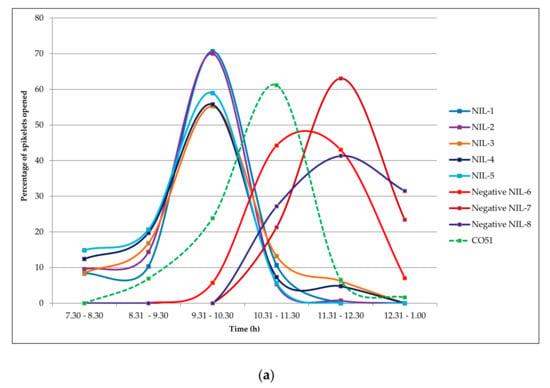
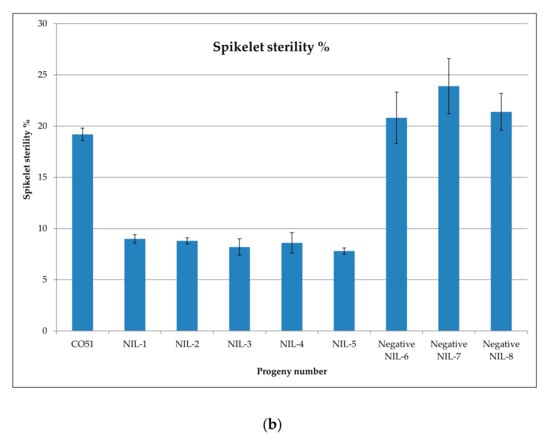
Figure 5.
Flowering pattern and spikelet sterility of CO 51 NILs harboring qEMF3 during summer 2019; (a). Flowering pattern; (b). Spikelet sterility %.
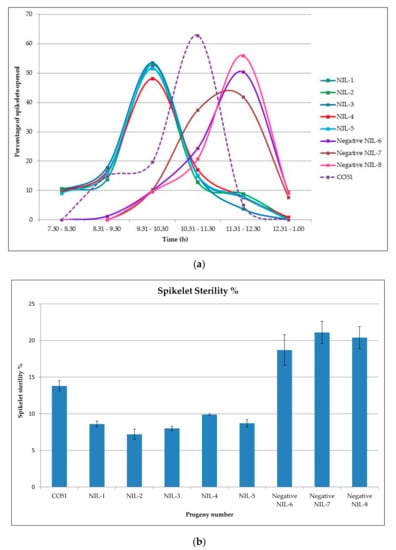
Figure 6.
Flowering pattern (a) and spikelet sterility (b) of NILs harboring qEMF3 in CO 51 background during Kharif 2019.

Table 3.
Agronomic performance of the progenies of CO 51 harboring qEMF3.
4. Discussion
The increased susceptibility of rice to elevated temperatures during its flowering period may be attributed to its anthesis pattern. In most of the cultivated rice cultivars, the anthesis starts at around 8.30 a.m. to 9 a.m. and extends up to 1.30 to 2.00 p.m. The anthesis process reaches its peaks at around 11.30 a.m. to 12.00 noon. The spikelets that open after 11.00 a.m. are exposed to elevated temperatures due to which the majority of the spikelets become sterile. In this study, attempts were made to evaluate the impact of high temperature on spikelet sterility among three genotypes (namely, CO 51, IR64 and IR64-qEMF3) exhibiting altered anthesis pattern. Both CO 51 and IR64 cultivars exhibited the onset of anthesis after 9.00 a.m., whereas IR64-qEMF3 started its anthesis by 7.50 a.m. In IR64-qEMF3, the peak flowering was recorded at around 10.30 a.m. (1½ h earlier than its recurrent parent) and thereby helped to escape from the high temperature (Figure 2a,b). It was clearly observed that the spikelets that opened during late morning to noon hours showed increased sterility in both CO 51 and IR64 (Figure 2). In contrast, IR64-qEMF3 showed the peak flowering before 9.30 a.m. and exhibited a relatively low sterility of 6.9% (Table 1). The sterility significantly increased in CO 51 (15.5%) and IR64 (15.05%) varieties that had a peak flowering between 10.30 a.m. and 11.30 AM.
In a similar experiment conducted at IRRI, Philippines, the qEMF3 loci advanced the Flower Opening Time (FOT) by 1.5–2.0 h during both wet as well as dry seasons [23]. Another field experiment conducted in Tamil Nadu, India revealed that the IR64 + qEMF3 variety recorded an early FOT and low sterility [24]. It was also observed that the spikelet sterility increased along with increasing temperature in a day, i.e., towards noon hours. The spikelets that opened between 9.00 a.m. and 10.00 a.m., when the temperature was around 31.7 °C, recorded less than 10% spikelet sterility. On the other hand, the spikelets that opened after 11.00 a.m., when the air temperature was above 33.2 °C, recorded higher spikelet sterility (35%).
In the current study, the two popular varieties CO 51 and IR64 exhibited their peak flowering between 10.30 a.m. and 11.30 a.m. and recorded increased sterility % than the other genotype, i.e., IR64-qEMF3, which flowered early in the morning. Another experiment by Ye et al. [32] revealed that the EMF trait is highly effective in terms of escaping from the high temperature (38 °C). The current study outcomes established the efficacy of the heat escape mechanism (early morning flowering) to overcome the heat induced yield losses in rice.
Wu et al. [33] evaluated the effect of high temperature during flowering and grain-filling stages on the grain yield and yield-related traits among three cultivars, namely N22, Shanyou 63 and Liangyoupeijiu. It was unearthed that the heat stress during the panicle initiation phase significantly reduced the seed setting rate, grain weight and spikelet number per panicle [34]. It was reported in several studies that the seed setting rate is highly affected when the plants are exposed to high temperatures during their flowering and grain-filling stages [35]. It was understood that the optimum temperature for reproductive phase in rice is 20–30 °C and temperatures above 35 °C tend to create negative effects on its yield [9,36]. Also, in the current study, when the genotypes were exposed to high temperature during their flowering stage, it exhibited a negative effect on the grain yield and spikelet fertility. From this study, it can be understood that the exposure to high temperatures during flowering and grain-filling stages negatively impact the spikelet fertility % and grain yield.
This study confirmed the efficacy of qEMF3 in promoting early morning flowering and mitigating heat induced yield losses in rice. The onset of anthesis in the NILs of CO 51 harboring qEMF3 was at approximately 7.30 a.m. (Figure 5 and Figure 7) and the peak flowering was at approximately 9.30 a.m. The recurrent parent and the negative lines exhibited a delay in the onset of flowering (after 9.00 a.m.), and hence the peak flowering coincided with the elevated temperature. The early morning flowering behavior of qEMF3 allowed the spikelets to escape from the heat waves, and hence the spikelet sterility rate got reduced to 7.8–9% against the spikelet sterility rate of the recurrent parent CO 51 (19.2%) and grain yield/plant is increased when compared to the recurrent parent.
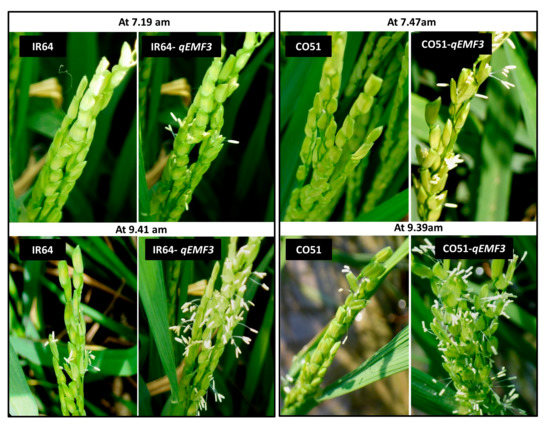
Figure 7.
First and the peak flowering patterns of NILs and their parents.
The outcomes of this study are in accordance with the previous reports that qEMF3 facilitated CO 51 to escape from the damage caused by heat stress above 38 °C [23,27] by shifting its Flower Opening Time (FOT) to cooler early morning hours [6]. Ishimaru et al [29] evaluated the impact of the early morning flowering trait in increasing the grain yield/plant under high temperature conditions. The researchers evaluated IR64 and IR64-qEMF3 (NIL harboring qEMF3) under different environmental conditions and different seasons between 2014 and 2021 and confirmed that the yield got enhanced in IR64-qEMF3 by increasing the number of filled grains.
5. Conclusions and Prospects
Overall, qEMF3 was found to be effective under different genetic backgrounds, viz., Nanging, IR64 and CO 51, in modulating the anthesis pattern and mitigating heat-induced yield losses in rice. This study has paved way for developing heat resilient rice varieties exhibiting heat escape mechanism, which can serve as a pre-breeding material for pyramiding heat tolerance QTLs.
Author Contributions
Conceptualization, project implementation, project monitoring T.I., S.K.J. and R.M.; conceptualization writing—review and editing and funding acquisition, R.M.; investigation, formal analysis and data collection, B.A.; data collection, R.K. and V.M.; project monitoring, data curation, S.D., S.A. and S.M.; data curation, formal analysis, P.S.; funding acquisition, manuscript revision, G.V. All authors have read and agreed to the published version of the manuscript.
Funding
This research was funded by Department of Biotechnology, Government of India, New Delhi (Grant # BT/PR13454). The support of IRRI, Philippines through CSISA project is also acknowledged.
Institutional Review Board Statement
Not applicable.
Data Availability Statement
Not applicable.
Conflicts of Interest
The authors declare no conflict of interest.
References
- Abberton, M.; Batley, J.; Bentley, A.; Bryant, J.; Cai, H.; Cockram, J.; Costa de Oliveira, A.; Cseke, L.J.; Dempewolf, H.; De Pace, C. Global agricultural intensification during climate change: A role for genomics. Plant Biotechnol. J. 2016, 14, 1095–1098. [Google Scholar] [CrossRef] [PubMed]
- FAO. FAO Stat Statistical Database (Food and Agriculture Organization of the United Nations); FAO: Rome, Italy, 2022. [Google Scholar]
- Battisti, D.S.; Naylor, R.L. Historical warnings of future food insecurity with unprecedented seasonal heat. Science 2009, 323, 240–244. [Google Scholar] [CrossRef] [PubMed]
- Cline, W.R. Global warming and agriculture. Financ. Dev. 2008, 45, 23. [Google Scholar]
- Zhao, L.; Lei, J.; Huang, Y.; Zhu, S.; Chen, H.; Huang, R.; Peng, Z.; Tu, Q.; Shen, X.; Yan, S. Mapping quantitative trait loci for heat tolerance at anthesis in rice using chromosomal segment substitution lines. Breed. Sci. 2016, 66, 15084. [Google Scholar] [CrossRef]
- Satake, T.; Yoshida, S. High temperature-induced sterility in indica rices at flowering. Jpn. J. Crop Sci. 1978, 47, 6–17. [Google Scholar] [CrossRef]
- Matsui, T.; Omasa, K.; Horie, T. High temperature-induced spikelet sterility of japonica rice at flowering in relation to air temperature, humidity and wind velocity conditions. Jpn. J. Crop Sci. 1997, 66, 449–455. [Google Scholar] [CrossRef]
- Ayyenar, B.; Premnath, A.; Ramachandran, M.; Manonmani, S.; Sudhakar, D.; Muthurajan, R. Analyzing genetic variations for head rice recovery under heat stress in rice (Oryza sativa L.). Electron. J. Plant Breed. 2022, 13, 83–91. [Google Scholar]
- Prasad, P.; Boote, K.; Allen, L., Jr.; Sheehy, J.; Thomas, J. Species, ecotype and cultivar differences in spikelet fertility and harvest index of rice in response to high temperature stress. Field Crops Res. 2006, 95, 398–411. [Google Scholar] [CrossRef]
- Wassmann, R.; Jagadish, S.; Sumfleth, K.; Pathak, H.; Howell, G.; Ismail, A.; Serraj, R.; Redona, E.; Singh, R.; Heuer, S. Regional vulnerability of climate change impacts on Asian rice production and scope for adaptation. Adv. Agron. 2009, 102, 91–133. [Google Scholar]
- Yoshida, S.; Satake, T.; Mackill, D. High-temperature stress in rice [study conducted at IRRI, Philippines]. IRRI Res. Pap. Ser. 1981, 67, 16. [Google Scholar]
- Peng, S.; Huang, J.; Sheehy, J.E.; Laza, R.C.; Visperas, R.M.; Zhong, X.; Centeno, G.S.; Khush, G.S.; Cassman, K.G. Rice yields decline with higher night temperature from global warming. Proc. Natl. Acad. Sci. USA 2004, 101, 9971–9975. [Google Scholar] [CrossRef] [PubMed]
- Jagadish, S.K.; Craufurd, P.Q.; Wheeler, T. High temperature stress and spikelet fertility in rice (Oryza sativa L.). J. Exp. Bot. 2007, 58, 1627–1635. [Google Scholar] [CrossRef] [PubMed]
- Jagadish, K.S.; Craufurd, P.; Shi, W.; Oane, R. A phenotypic marker for quantifying heat stress impact during microsporogenesis in rice (Oryza sativa L.). Funct. Plant Biol. 2013, 41, 48–55. [Google Scholar] [CrossRef] [PubMed]
- Nakagawa, H.; Horie, T.; Matsui, T. Effects of climate change on rice production and adaptive technologies. In Proceedings of the Rice Science: Innovations and Impact for Livelihood, International Rice Research Conference, Beijing, China, 16–19 September 2002; pp. 635–658. [Google Scholar]
- Djanaguiraman, M.; Narayanan, S.; Erdayani, E.; Prasad, P.V. Effects of high temperature stress during anthesis and grain filling periods on photosynthesis, lipids and grain yield in wheat. BMC Plant Biol. 2020, 20, 268. [Google Scholar] [CrossRef] [PubMed]
- Matsui, T.; Omasa, K.; Horie, T. The difference in sterility due to high temperatures during the flowering period among japonica-rice varieties. Plant Prod. Sci. 2001, 4, 90–93. [Google Scholar] [CrossRef]
- Matsui, T.; Omasa, K. Rice (Oryza sativa L.) cultivars tolerant to high temperature at flowering: Anther characteristics. Ann. Bot. 2002, 89, 683–687. [Google Scholar] [CrossRef] [PubMed]
- Jagadish, S.; Muthurajan, R.; Oane, R.; Wheeler, T.R.; Heuer, S.; Bennett, J.; Craufurd, P. Physiological and proteomic approaches to address heat tolerance during anthesis in rice (Oryza sativa L.). J. Exp. Bot. 2010, 61, 143–156. [Google Scholar] [CrossRef] [PubMed]
- Ishimaru, T.; Xaiyalath, S.; Nallathambi, J.; Sathishraj, R.; Yoshimoto, M.; Phoudalay, L.; Samson, B.; Hasegawa, T.; Hayashi, K.; Arumugam, G. Quantifying rice spikelet sterility in potential heat-vulnerable regions: Field surveys in Laos and southern India. Field Crops Res. 2016, 190, 3–9. [Google Scholar] [CrossRef]
- Osada, A.; Sasiprapa, V.; Rahong, M.; Dhammanuvong, S.; Chakrabndhu, H. Abnormal occurrence of empty grains of indica rice plants in the dry, hot season in Thailand. Jpn. J. Crop Sci. 1973, 42, 103–109. [Google Scholar] [CrossRef]
- Matsushima, S.; Ikewada, H.; Maeda, A.; Honma, S.; Niki, H. Studies on Rice Cultivation in the Tropics 1. Yielding and ripening responses of the rice plant to the extremely hot and dry climate in Sudan. Jpn. J. Trop. Agric. 1982, 26, 19–25. [Google Scholar]
- Hirabayashi, H.; Sasaki, K.; Kambe, T.; Gannaban, R.B.; Miras, M.A.; Mendioro, M.S.; Simon, E.V.; Lumanglas, P.D.; Fujita, D.; Takemoto-Kuno, Y. qEMF3, a novel QTL for the early-morning flowering trait from wild rice, Oryza officinalis, to mitigate heat stress damage at flowering in rice, O. sativa. J. Exp. Bot. 2015, 66, 1227–1236. [Google Scholar] [CrossRef] [PubMed]
- Bheemanahalli, R.; Sathishraj, R.; Manoharan, M.; Sumanth, H.; Muthurajan, R.; Ishimaru, T.; Krishna, J.S. Is early morning flowering an effective trait to minimize heat stress damage during flowering in rice? Field Crops Res. 2017, 203, 238–242. [Google Scholar] [CrossRef] [PubMed]
- Julia, C.; Dingkuhn, M. Variation in time of day of anthesis in rice in different climatic environments. Eur. J. Agron. 2012, 43, 166–174. [Google Scholar] [CrossRef]
- Julia, C.; Dingkuhn, M. Predicting temperature induced sterility of rice spikelets requires simulation of crop-generated microclimate. Eur. J. Agron. 2013, 49, 50–60. [Google Scholar] [CrossRef]
- Ishimaru, T.; Hirabayashi, H.; Ida, M.; Takai, T.; San-Oh, Y.A.; Yoshinaga, S.; Ando, I.; Ogawa, T.; Kondo, M. A genetic resource for early-morning flowering trait of wild rice Oryza officinalis to mitigate high temperature-induced spikelet sterility at anthesis. Ann. Bot. 2010, 106, 515–520. [Google Scholar] [CrossRef]
- Sathishraj, R.; Bheemanahalli, R.; Ramachandran, M.; Dingkuhn, M.; Muthurajan, R.; Krishna, J.S. Capturing heat stress induced variability in spikelet sterility using panicle, leaf and air temperature under field conditions. Field Crops Res. 2016, 190, 10–17. [Google Scholar] [CrossRef]
- Ishimaru, T.; Hlaing, K.T.; Oo, Y.M.; Lwin, T.M.; Sasaki, K.; Lumanglas, P.D.; Simon, E.-V.M.; Myint, T.T.; Hairmansis, A.; Susanto, U. An early-morning flowering trait in rice can enhance grain yield under heat stress field conditions at flowering stage. Field Crops Res. 2022, 277, 108400. [Google Scholar] [CrossRef]
- Robin, S.; Mohanasundaram, K.; Manonmani, S.; Rajeswari, S.; Jeyaprakash, P.; Pushpam, R.; Thiagarajan, K.; Rabindran, R.; Suresh, S.; Ravichandran, V. TNAU Rice CO 51 (IET 21605)-A high yielding short duration fine grain rice variety for Tamil Nadu. Electron. J. Plant Breed. 2019, 10, 324–333. [Google Scholar] [CrossRef]
- Van Berloo, R. Computer note. GGT: Software for the display of graphical genotypes. J. Hered. 1999, 90, 328–329. [Google Scholar] [CrossRef]
- Ye, C.; Li, X.; Redoña, E.; Ishimaru, T.; Jagadish, K. Genetics and Breeding of Heat Tolerance in Rice. In Rice Improvement; Springer: Cham, Switzerland, 2021; pp. 203–220. [Google Scholar]
- Wu, W.; Duncan, R.W.; Ma, B.L. The stage sensitivity of short-term heat stress to lodging-resistant traits and yield determination in canola (Brassica napus L.). J. Agron. Crop Sci. 2021, 207, 74–87. [Google Scholar] [CrossRef]
- Wang, Y.; Wang, L.; Zhou, J.; Hu, S.; Chen, H.; Xiang, J.; Zhang, Y.; Zeng, Y.; Shi, Q.; Zhu, D. Research progress on heat stress of rice at flowering stage. Rice Sci. 2019, 26, 1–10. [Google Scholar] [CrossRef]
- Dou, Z.; Tang, S.; Li, G.; Liu, Z.; Ding, C.; Chen, L.; Wang, S.; Ding, Y. Application of nitrogen fertilizer at heading stage improves rice quality under elevated temperature during grain-filling stage. Crop Sci. 2017, 57, 2183–2192. [Google Scholar] [CrossRef]
- Wassmann, R.; Jagadish, S.; Heuer, S.; Ismail, A.; Redona, E.; Serraj, R.; Singh, R.; Howell, G.; Pathak, H.; Sumfleth, K. Climate change affecting rice production: The physiological and agronomic basis for possible adaptation strategies. Adv. Agron. 2009, 101, 59–122. [Google Scholar]
Disclaimer/Publisher’s Note: The statements, opinions and data contained in all publications are solely those of the individual author(s) and contributor(s) and not of MDPI and/or the editor(s). MDPI and/or the editor(s) disclaim responsibility for any injury to people or property resulting from any ideas, methods, instructions or products referred to in the content. |
© 2023 by the authors. Licensee MDPI, Basel, Switzerland. This article is an open access article distributed under the terms and conditions of the Creative Commons Attribution (CC BY) license (https://creativecommons.org/licenses/by/4.0/).

